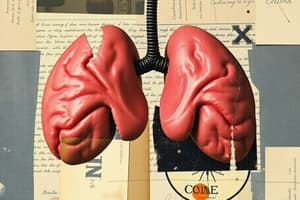Podcast
Questions and Answers
Which clinical feature is most commonly associated with Cushing's disease?
Which clinical feature is most commonly associated with Cushing's disease?
- Menstrual disorders (correct)
- Proximal muscle weakness (correct)
- Low libido (correct)
- Osteopenia (correct)
What is the prevalence percentage of obesity in patients with Cushing's syndrome?
What is the prevalence percentage of obesity in patients with Cushing's syndrome?
- 80%
- 70%
- 90% (correct)
- 85%
Which of the following is associated with a high incidence of Cushing's syndrome?
Which of the following is associated with a high incidence of Cushing's syndrome?
- Venous thromboembolism (correct)
- Kidney stones
- Hyperthyroidism
- Hypoglycemia
In which condition is easy bruising a notable clinical feature?
In which condition is easy bruising a notable clinical feature?
What laboratory finding is typically observed in patients with Cushing's syndrome?
What laboratory finding is typically observed in patients with Cushing's syndrome?
What percentage of Cushing's syndrome patients experiences insomnia?
What percentage of Cushing's syndrome patients experiences insomnia?
What is a common skin manifestation in patients with Cushing's disease?
What is a common skin manifestation in patients with Cushing's disease?
Which metabolic complication is frequently linked to Cushing's syndrome?
Which metabolic complication is frequently linked to Cushing's syndrome?
Which of the following is a characteristic of ACTH-dependent Cushing syndrome?
Which of the following is a characteristic of ACTH-dependent Cushing syndrome?
Which clinical feature is commonly associated with Cushing syndrome?
Which clinical feature is commonly associated with Cushing syndrome?
What is the primary cause of Cushing disease?
What is the primary cause of Cushing disease?
What distinguishes ACTH-independent Cushing syndrome from ACTH-dependent types?
What distinguishes ACTH-independent Cushing syndrome from ACTH-dependent types?
Which of the following is NOT a cause of ACTH-independent Cushing syndrome?
Which of the following is NOT a cause of ACTH-independent Cushing syndrome?
What is one of the presenting features of Cushing syndrome?
What is one of the presenting features of Cushing syndrome?
What is the role of cortisol in ACTH-independent Cushing syndrome?
What is the role of cortisol in ACTH-independent Cushing syndrome?
Which classification of Cushing syndrome involves ectopic ACTH syndrome?
Which classification of Cushing syndrome involves ectopic ACTH syndrome?
Flashcards are hidden until you start studying
Study Notes
### Cushing Syndrome
- Chronic glucocorticoid excess
- Leads to a constellation of symptoms and physical features
- Can be caused by various factors
### Cushing Disease
- A specific type of Cushing syndrome
- Due to excessive pituitary ACTH secretion from a pituitary tumor
Classification
- Can be either ACTH-dependent or ACTH-independent
ACTH-Dependent
- Caused by chronic ACTH hypersecretion
- Leads to hyperplasia of the adrenal zonae fasciculata and reticularis
- Causing increased secretion of cortisol and androgens
- Can be due to either pituitary adenoma (Cushing disease) or non-pituitary neoplasm (ectopic ACTH)
ACTH-Independent
- Caused by a primary adrenal neoplasm or nodular adrenal hyperplasia
- Cortisol excess suppresses pituitary ACTH secretion
- Can be caused by iatrogenic factors (glucocorticoid, megestrol acetate), adrenal neoplasm (adenoma, carcinoma), nodular adrenal hyperplasia, or factitious
- Nodular adrenal hyperplasia can be due to:
- Primary pigmented nodular adrenal disease (PPNAD)
- Massive macronodular adrenal hyperplasia
- Food dependent (GIP mediated)
Clinical Features
- May be present for several years prior to diagnosis
- May not always be florid, but clinical suspicion should be high
- Facial appearance:
- Round plethoric complexion
- Acne and hirsutism
- Thinning of scalp hair
- Weight gain, truncal obesity, buffalo hump, supraclavicular fat pads
- Skin:
- Thin and fragile due to loss of subcutaneous tissue
- Purple striae on abdomen, breasts, thighs, axillae
- Easy bruising
- Tinea versicolor
- Occasionally pigmentation due to ACTH
- Proximal muscle weakness
- Mood disturbance: labile, depression, insomnia, psychosis
- Menstrual disturbance
- Low libido and impotence
- High incidence of venous thromboembolism
- Overall mortality greater than of general population (by a factor of 6)
- Growth arrest in children
Associated Features
- Hypertension (>50%) due to mineralocorticoid effects of cortisol
- Impaired glucose tolerance/diabetes mellitus (30%)
- Osteopenia and osteoporosis (leading to fractures of spine and ribs)
- Vascular disease due to metabolic syndrome
- Susceptibility to infections
Diagnosis
- Clinical suspicion of Cushing syndrome must be confirmed with biochemical studies
- General assessment of patients regarding the presence of other illnesses, drugs, alcohol, and psychiatric problems is needed
Laboratory Findings
- CBC:
- High normal hemoglobin, hematocrit, and red cell counts are usual
- Polycythemia is rare
- Total white count is usually normal
- Percentage of lymphocytes and total lymphocyte count may be subnormal
Clinical Features Prevalence
- General:
- Obesity (90%)
- Hypertension (85%)
- Musculoskeletal:
- Osteopenia (80%)
- Weakness (65%)
- Gonadal dysfunction:
- Menstrual disorders (70%)
- Impotence, decreased libido (85%)
- Skin:
- Plethora (70%)
- Hirsutism (75%)
- Striae (50%)
- Acne (35%)
- Bruising (35%)
- Neuropsychiatric:
- Emotional lability (85%)
- Euphoria (85%)
- Depression (85%)
- Psychosis (85%)
- Metabolic:
- Glucose intolerance (75%)
- Diabetes (20%)
- Hyperlipidemia (70%)
- Polyuria (30%)
- Kidney stones (15%)
Studying That Suits You
Use AI to generate personalized quizzes and flashcards to suit your learning preferences.


